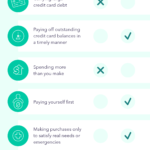While it may seem like a simple determination, deciding whether a purchase is worth the cost can actually get pretty complicated. How do you quantify the value of a new bike, a pair of shoes or tickets to a concert? How can we be sure that any discretionary expense is actually worth it?
If you’ve ever agonized over these questions, you might be interested in learning about the “Worth It” equation. Here’s how it works.
Is It Worth Buying?
Before making a major purchase, consider if the item is worth the time it would take to earn that amount of money. For example, let’s say you want to buy the new iPhone model that costs $800. Your hourly rate at work is $35 so it would take you about 23 hours – or a little more than half a workweek – to earn enough to pay for that iPhone.
So in this instance, you would consider whether or not the phone is worth 23 hours of work. The answer may depend on how long you’ve been waiting to buy a new phone and how much you like your job.
You can use this calculation for both large and small purchases. For example, if you’re buying a pair of $80 jeans and your hourly rate is $40, consider if the jeans are worth two hours at your job. If you love how you look in the jeans, then two hours of work may be nothing. But if you’re on the fence, then two hours may seem like a bit much.
Other Factors to Consider Before You Buy
Will This Purchase Save Me Time?
One of my favorite ways to spend money is to buy myself time back. This includes paying someone else to mow the lawn, clean the house and deliver groceries. Freeing up time is an underrated way to spend money, especially if I can use that time doing something I love, like hanging out with friends, watching a movie or just relaxing with my pets.
Because I’m self-employed, I can also work during that time and ultimately earn more money than I’m spending to outsource the task.
Will This Purchase Give Me Joy or Peace of Mind?
Not every item we buy has to have a utilitarian purpose. It’s totally fine to buy things because we think they’ll make us happier in some way.
I try to use the Marie Kondo benchmark. When considering a nonessential purchase, I ask myself if the item sparks joy. If a dress makes me happy when I put it on, I’ll buy it. But if I’m only tempted because it’s 50% off, I put it back on the rack (usually).
When you set the bar high enough, you end up with items that you truly love. This also cuts down on clutter and buyer’s remorse.
Will This Purchase Generate Income?
The classic quote about spending money to make money is often true. If you’re investing in your career, you may have to pony up for a course or conference before you start to see real progress.
In 2014, I attended a financial media conference to support my new hobby of blogging about my student loan debt. I spent about $800 for the four-day event and hoped I would learn how to monetize my writing.
At the conference, I networked with fellow attendees and landed a few freelance writing gigs. After a couple of months, the conference had paid for itself. After a year, I was making the same amount of money freelance writing as I was making with my day job.
Will This Purchase Improve My Quality of Life?
Growing up, my frugal mom loved to clip coupons and hunt for the best deals. But she always told me to spend money on my health.
Now that I’m in my 30s, I take her advice to heart by prioritizing my physical and mental health. My husband and I buy high-quality groceries, spend thousands on equipment for our home gym and pay for therapy sessions out-of-pocket.
Even though these expenses take up a huge chunk of our budget, they’re worth the price. Paying for therapy or a gym membership may not earn you money directly, but you’ll be investing in something more valuable – a healthy future.
How Often Will I Use It?
I hate blow drying my hair and am always looking for a way to speed up the process. When I heard about a Dyson hairdryer that could accelerate the hair drying process, I instantly wanted it. I planned to use a birthday check from my parents to help cover the cost.
But eventually, I realized that I wouldn’t use the $400 blow dryer often enough to justify the cost. Even though I could afford it – and it probably would make my life easier – I couldn’t justify spending that much on something I only use a couple of times a month.
Am I Buying It to Avoid Feeling My Feelings?
The concept of retail therapy is well-known. When you’re feeling down, you go shopping to cheer yourself up.
But in my experience, retail therapy is a fleeting cure. Once the shopping high has worn off, something worse usually sets in: buyer’s remorse. Now you feel even worse because you spent money on something you didn’t really want or need.
Before buying something, ask yourself if you’re spending money just to make yourself feel better or avoid your feelings. If you are, consider doing something more worthwhile instead. That could mean calling a friend, walking your dog or watching an episode of your favorite TV show.
The post The Worth It Equation appeared first on MintLife Blog.


